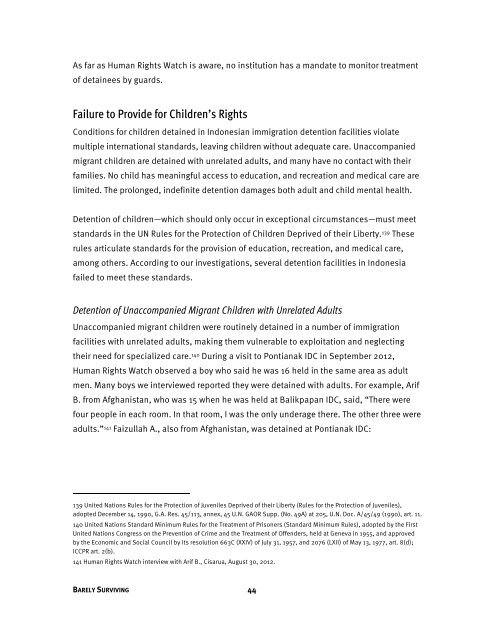Download the full report - Human Rights Watch
Download the full report - Human Rights Watch
Download the full report - Human Rights Watch
You also want an ePaper? Increase the reach of your titles
YUMPU automatically turns print PDFs into web optimized ePapers that Google loves.
As far as <strong>Human</strong> <strong>Rights</strong> <strong>Watch</strong> is aware, no institution has a mandate to monitor treatment<br />
of detainees by guards.<br />
Failure to Provide for Children’s <strong>Rights</strong><br />
Conditions for children detained in Indonesian immigration detention facilities violate<br />
multiple international standards, leaving children without adequate care. Unaccompanied<br />
migrant children are detained with unrelated adults, and many have no contact with <strong>the</strong>ir<br />
families. No child has meaningful access to education, and recreation and medical care are<br />
limited. The prolonged, indefinite detention damages both adult and child mental health.<br />
Detention of children—which should only occur in exceptional circumstances—must meet<br />
standards in <strong>the</strong> UN Rules for <strong>the</strong> Protection of Children Deprived of <strong>the</strong>ir Liberty. 139 These<br />
rules articulate standards for <strong>the</strong> provision of education, recreation, and medical care,<br />
among o<strong>the</strong>rs. According to our investigations, several detention facilities in Indonesia<br />
failed to meet <strong>the</strong>se standards.<br />
Detention of Unaccompanied Migrant Children with Unrelated Adults<br />
Unaccompanied migrant children were routinely detained in a number of immigration<br />
facilities with unrelated adults, making <strong>the</strong>m vulnerable to exploitation and neglecting<br />
<strong>the</strong>ir need for specialized care. 140 During a visit to Pontianak IDC in September 2012,<br />
<strong>Human</strong> <strong>Rights</strong> <strong>Watch</strong> observed a boy who said he was 16 held in <strong>the</strong> same area as adult<br />
men. Many boys we interviewed <strong>report</strong>ed <strong>the</strong>y were detained with adults. For example, Arif<br />
B. from Afghanistan, who was 15 when he was held at Balikpapan IDC, said, “There were<br />
four people in each room. In that room, I was <strong>the</strong> only underage <strong>the</strong>re. The o<strong>the</strong>r three were<br />
adults.” 141 Faizullah A., also from Afghanistan, was detained at Pontianak IDC:<br />
139 United Nations Rules for <strong>the</strong> Protection of Juveniles Deprived of <strong>the</strong>ir Liberty (Rules for <strong>the</strong> Protection of Juveniles),<br />
adopted December 14, 1990, G.A. Res. 45/113, annex, 45 U.N. GAOR Supp. (No. 49A) at 205, U.N. Doc. A/45/49 (1990), art. 11.<br />
140 United Nations Standard Minimum Rules for <strong>the</strong> Treatment of Prisoners (Standard Minimum Rules), adopted by <strong>the</strong> First<br />
United Nations Congress on <strong>the</strong> Prevention of Crime and <strong>the</strong> Treatment of Offenders, held at Geneva in 1955, and approved<br />
by <strong>the</strong> Economic and Social Council by its resolution 663C (XXIV) of July 31, 1957, and 2076 (LXII) of May 13, 1977, art. 8(d);<br />
ICCPR art. 2(b).<br />
141 <strong>Human</strong> <strong>Rights</strong> <strong>Watch</strong> interview with Arif B., Cisarua, August 30, 2012.<br />
BARELY SURVIVING 44
















